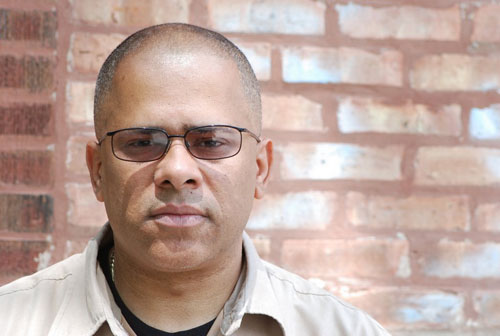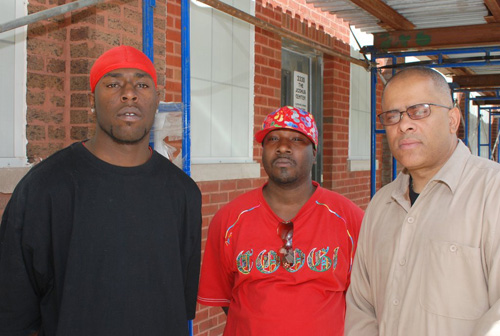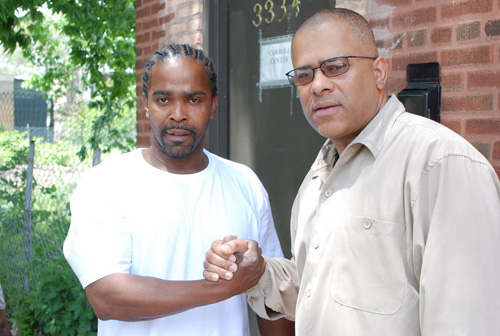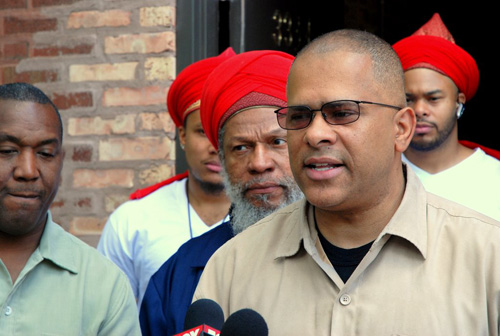Gun violence in Chicago seems to rise as reliably as the thermometer's mercury every summer. While the Chicago Police Department makes headlines with amped-up, SWAT team assisted street patrols and increased fire power, a consensus on how best to fight the violence has taken shape outside of the law enforcement establishment. Academics, community organizers and former gang members all seem to highlight the rift between police and community, a rift that they say threatens the efficacy of any police strategy that fails to recognize and deal with it; their diagnostics tend to stand at odds with many police prescriptions.

Meet Tio Hardiman. Tio grew up in the Henry Horner housing projects on the West Side of Chicago. With tales of a subculture marginalized by the criminal justice system and defunct of a social network, he paints a chilling portrait of a city within a city where an anarchic system of violence fills the void of legitimate law and order.
"Violence is normal where I come from," says Hardiman. He recalls the feeling he had when, at the age of 16, his step-father caught up with and shot the man who had beaten Tio up on the street days before. "It made me feel damn good to see that guy get shot," he says, "I felt vindicated." Blurred by that vindication was the reality that Hardiman was doing little more than inheriting a long and futile cycle of violence that would take years and incarceration to break.
Hardiman now works as a director of Gang Mediation and Community Organizing for CeaseFire, a large non-profit street outreach program based out of UIC's School of Public Health. CeaseFire takes a decidedly different approach to reducing violence than most police departments. Rather than aiming to eradicate illegal activity altogether, CeaseFire's staff of outreach workers and violence interruptors are trying to change the "culture of violence" that is endemic in Chicago's poor, largely black and latino communities. "I'm not interested in stopping all the drug dealing. The drug problem is bigger than me and it's bigger than the brothers selling the drugs," says Hardiman. "We work to directly change the thinking and behavior of the young people, and to mediate conflicts that can become violent."

CeaseFire community organizers teach residents how to talk friends and relatives out of instigative and retaliatory violence they may be planning, create public protests against violence, and more generally try to "make every act of violence into a big deal in the community, to say to young people, 'this is unacceptable,'" says Hardiman. Violence interruptors speak directly with high risk individuals, those with a history of violence and involved in armed disputes. Largely former gang members and ex-convicts with earned respect on the street, violence interruptors have an unprecedented level of access to and influence over those most prone to shooting.
"These are infamous guys from the past — community icons that have transformed their lives," says Hardiman. "Most guys can go to the corner and tell people to stop shooting. The violence interruptors can go into the inner-circle meetings where shootings are plotted and say, 'Look bro, we're not gonna do this. Let this stuff go, it ain't worth it.'"
This is the right approach, says Dr. John Hagedorn, and something police need to be doing more of. Dr. Hagedorn is an associate professor of Criminology, Law and Justice and senior research fellow at the UIC's Great Cities Institute. He has written widely on violence and Chicago gangs, publishing articles in scholarly journals and newspapers and authoring several books on the topic. He says police need to be more involved face-to-face with gang members and those likely to commit acts of violence in order to be effective. Waging war on gangs with military tactics will only further marginalize those at risk, making them more prone to violence, he says. "Police need to work cooperatively with community leaders and gang members to alleviate violence. Isn't 40 years of war on gangs long enough?"

Police have always been deployed in greater numbers to high-risk areas with little success, says Hardiman. "The violence doesn't ever really come down, per se. It either stays where it's at or goes up." Many of the affected communities have lost their confidence in the police, he says; histories of police brutality, innocent men and women locked up or shot dead in the street, all remain fresh in the minds of many poor blacks in Chicago. "A lot of healing needs to be done (between police and communities)," he says.
It's an arduous task to be sure, but Hardiman is not pessimistic. "There used to be a time when the beat officer would know everybody on his beat. Everybody," he says. Back then, people respected the officers patrolling their beat; now, talking to police has become a taboo in most poor communities. Hardiman says that for policing to be effective again, this relationship needs to be restored. "The beat officer has to be reintegrated into the community."
At DePaul University, Dr. Greg Scott has come to similar conclusions. An associate professor of Crime and Delinquency, Community Studies and Street Gangs, Scott has spent the last decade-plus on the streets studying gangs and inner-city crime from within. He has interviewed hundreds of gang members and street criminals as well as ridden alongside police patrolmen and tactical officers, producing scholarly research and film and radio documentaries. He says police need to learn not to shame the people they are trying to protect. From what he has seen, most officers treat young people as criminals from the moment they suspect them as such.
Hardiman agrees. "In this country, they say you're innocent until proven guilty, but most brothers say, if you're black, you're guilty until proven innocent," he says with a forced, uneasy chuckle. "So we need to have police start treating brothers a little differently."
And so, says Scott, "we need to train police officers on how to treat everyone they've arrested, everyone they're considering arresting, everyone they've stopped on reasonable suspicion, as innocent, because they have not been proven guilty yet." Go on a police ride-along, he says, and chances are any citizen they stop is treated as guilty from the get-go. "That flies in the face of our constitution, our bill of rights — everything that this country's justice system is supposed to stand for."
Scott suggests an exercise in role reversal. In a CAPS-like forum throughout the city, he would like to see cops sit quietly and allow every citizen who has been arrested or approached on suspicion talk to and treat the officers the way in which they were treated. "If cops don't experience the effects of systematic shaming," he says, "they're not going to change their ways."

In 2004, CeaseFire worked with 900 high-risk individuals, "gang-bangers with long histories of violence," says Hardiman. "We got 35 percent of them into employment, another 30 percent set up back in school and the other 35 percent or so into counseling services," such as substance abuse counseling and job training programs.
In addition, Hardiman adds, CeaseFire mediated over 200 conflicts that could have likely led to homicides or shootings. "We went right there to the belly of the beast and worked with the brothers and sisters right there on the street corners," he says, "and that's why the homicides came down," referring to a 25 percent drop in homicides that year — numbers unheard of in the 40 years police have been systematically targeting gangs.
To learn more about CeaseFire and its programs and to find out how to get involved, visit CeaseFireChicago.org.





